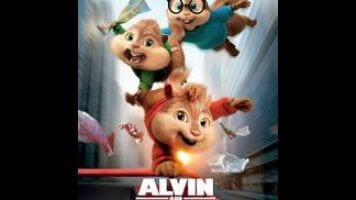The Chipmunks go somewhere cheap for The Road Chip

Though four years have elapsed since the release of the third and lowest-grossing Alvin And The Chipmunks movie, Chipwrecked, another sequel became inevitable as soon as the song “Uptown Funk” was released. Beyond the song’s near-instant status as the kind of wedding-playlist fodder that the Chipmunks have been covering in their signature irritating new pitch for decades, the word “funk” rhymes with “munk,” which is the second syllable of the word “chipmunk.” Puns that can be constructed from “chip” or “munk” represent roughly 80 percent of the creative inspiration behind the Alvin And The Chipmunks films. The other 20 percent is the coinage “Squeakquel.”
It makes sense, then, that the trailer for Alvin And The Chipmunks: The Road Chip (get it?) proudly shows off a scene where the titular rodents sing a confusing but catchy promise to “uptown munk you up.” It makes far less sense that in that same scene in the actual film, singers Alvin, Simon, and Theodore perform a relatively straightforward cover of “Uptown Funk.” They don’t say the non-word “munk” at all; the major alteration to the song is having the instrumentation provided by New Orleans street performers. Who is to blame for this oversight? Did screenwriters Randi Mayem Singer and Adam Sztykiel insist on paying strict homage to the original “Uptown Funk”? Or did director Walt Becker decide that altering the original lyrics destroyed the integrity of the scene where helium-voiced singing vermin lead the city of New Orleans in joyous song?
These questions might prove less distracting if the Chipmunks movies bothered to fulfill their initial promise to chronicle the musical adventures of a trio of world-famous rodent vocalists. This would probably still be irritating, but it would have the courage of its ridiculous convictions. But “Uptown Funk” is one of just a handful of musical numbers in The Road Chip. Instead, the movie focuses on the efforts of the Chipmunks to travel to Florida and stop their guardian and benevolent Svengali Dave (Jason Lee, looking more tired than ever) from proposing marriage to his girlfriend Shira (Kimberly Williams-Paisley). They’re helped along by Shira’s teenage son Miles (Josh Green), who has taken an instant and unexplained (if still somewhat understandable) dislike to the Chipmunks. The feeling is mutual, and the prospective step-siblings team up to sabotage their parents’ happiness and ensure they won’t have to spend more time in each other’s company.
Though this fits Alvin’s general profile of cruel egomania—forget just children’s movies; is there a less sympathetic hero in recent cinema?—and his series’ general profile of indifferently constructed stories, the line of reasoning for this mission is especially flimsy. Even the characters don’t seem to have much faith in their zany scheme (which is also decidedly lacking in both zaniness and scheming). Equally nonsensical is the way that the kids run afoul of a goofy air marshal played by Tony Hale, who pursues them for a long stretch of the film before it discards him. Hale essentially replaces his Arrested Development costar David Cross, who did bad-guy duty in the previous three films with such blatant disdain for the material that he scraped up a few laughs. Hale almost does the same when he threatens to place the trio in “chipmunk jail” before describing an exceedingly adorable miniature prison, but mostly he conducts experiments that involve mugging in a vacuum.
Hale deserves credit for trying his best; a Chipmunks movie looks like a lonely place. Though the three sweatshirted heroes are all computer-animated creations, they nonetheless rarely share the frame with Lee, who appears in many isolated one-shots. The movie features halfhearted cameos by John Waters and Retta, and opens with what amounts to a brief infomercial wherein chipmunks endorse a single by Redfoo (of LMFAO sorta-fame). There’s also a wanly amusing running joke about how the Chipettes, the Chipmunks’ female doppelgängers, are currently more popular than their male equivalents and are allowed to spend most of the movie offscreen as American Idol judges, further muddling the question of just how old Dave’s “kids” are supposed to be. (They chafe at Dave’s hiring of a babysitter, while the Chipettes seem to spend weeks if not months on their own.) The question of their legal parentage is supposed to be the emotional lynchpin of the movie, but this, too, is presented with an indifference that verges on confusion. When Shira asks Dave how it is Alvin, Simon, and Theodore are his “sons,” he replies that he never really thought about it, indicating (however briefly) that he may in fact have a hazy memory of whether or not he is the biological father of three chipmunks.
This apathetic meagerness in the face of what is supposed to be extraordinary fame and fortune accompanying the miracle of singing animals has become a series stand by. Even the movie’s promise of a road trip is desolate and mundane. By setting scenes in such high-end locations as a miniature golf course, a hotel room, and a Chuck E. Cheese’s, The Road Chip recalls the Simpsons movie parody Ernest Goes Somewhere Cheap. Kids don’t need the Chipmunks movies to take them somewhere cheap. They deserve a comedy or a musical or a cartoon—none of which The Road Chip quite is—that’s more than a high-pitched distraction.